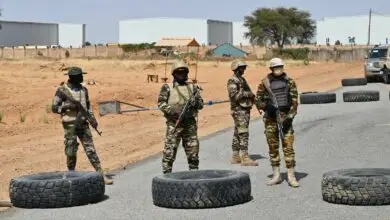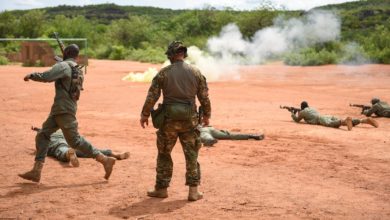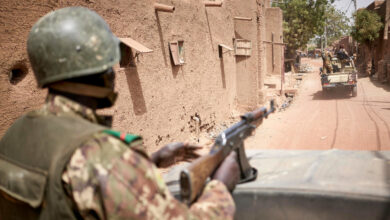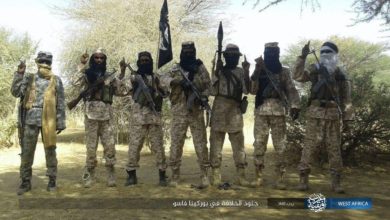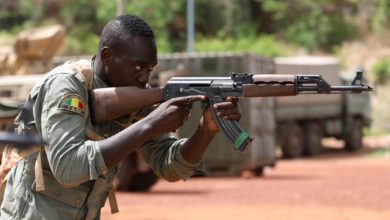Eleven Fulani civilians were kidnapped and killed in the latest bout of ethnic violence to hit Mali, local groups said on Thursday, while an official put the toll at 14.
The attack, which occurred in the restive central region of Mopti on Tuesday, August 7, was attributed to hunters from the Dogon community.
“Eleven Fulani civilians were kidnapped on Tuesday by the Bani river as they were going to the market in Sofara by Dogon militiamen who arrived on motorbikes,” Abdoul Aziz Diallo, who heads the country’s main Fulani association Tabital Pulaaku, told AFP.
“Today, we got proof that they were executed,” he added.
Ousmane Cisse, a member of Tabital Pulaaku Africa, another Fulani association, confirmed the account.
A local elected official who spoke to AFP on condition of anonymity estimated the death toll from Tuesday’s incident was 14 “who were kidnapped and murdered in cold blood.”
Apart from the 11 people who were kidnapped, four other Fulani civilians were seized later, the official said.
“One of them managed to escape by pretending to be dead. He is injured and is the one who got the information out,” the official said.
The victims’ families received on Wednesday evening “pieces of clothing” belonging to the dead, to allow them to organize mourning ceremonies.
Mali farmer-herder violence escalating
Violence has increased over the past three years in central Mali between nomadic Fulani herders and Bambara and Dogon farmers, sparked by accusations of Fulani grazing cattle on Dogon land and disputes over access to land and water, and fueled by accusations that the Fulanis are colluding with jihadists.
More than 300 civilians have died in ethnic clashes since the start of the year, according to United Nations figures and an AFP toll.
In July, armed men – also described as Dogon hunters – killed 17 Fulani civilians in the central Mali village of Somena, according to Fulani representatives.
On July 17, the spokesperson for the U.N. High Commissioner for Human Rights (OHCHR) said he was “deeply concerned” about the surge in intercommunal violence in Mali.
The U.N. peacekeeping mission in the country, Minusma, said at the time that at least 289 civilians had been killed in almost 100 documented incidents, 77 percent of which occurred in the Mopti region. The mission said it had recorded an escalation in attacks allegedly carried out by armed Dozos hunters and militias, who are linked to the Dogon ethnic group, against Fulani herders. The OHCHR said the increase in attacks raises concerns they are part of a deliberate attempt to intimidate farmers and undermine the communities’ food security.
The OHCHR said that although the attacks are said to be motivated by a desire to root out individuals linked to Jama’at nusrat al-Islam wal Muslimeen (JNIM), in reality “they have increasingly been indiscriminately targeting members of the Fulani community.”
JNIM is a fusion of three Malian jihadist groups linked to al-Qaeda. Also known as the Group to Support Islam and Muslims (GSIM), the group has been behind several high profile attacks against domestic and foreign forces since forming last year, including a bomb and gun attack on the headquarters of the G5 Sahel Joint Force in Sevare in the Mopti region of Mali in June.
The OHCHR said Dogon and Bambara communities have also been targeted by JNIM and Fulani militias.
Islamic extremists linked to al-Qaeda took control of the desert north of Mali in early 2012, exploiting a Taureg separatist uprising. France began a military intervention the next year that evolved into the current Operation Barkhane deployment with a mandate for counter-terror operations across the Sahel region.
Tensions and violence have intensified in the troubled area over the past three years with clashes between Fulani herdsmen and farmers from the Bambara and Dogon ethnic groups who accuse the pastoralists of colluding with jihadists.
In June, the U.N. Security Council renewed Minusma’s peacekeeping mission in Mali for another year, but warned that Mali must make “substantial progress on the country’s peace process.”
Jihadist violence, meanwhile, has spread from northern Mali to the center and south and spilled into neighboring Burkina Faso and Niger, often exacerbating communal conflicts.
Could mining offer a ‘third way’ for Nigeria to cool a simmering conflict?
With reporting from AFP



